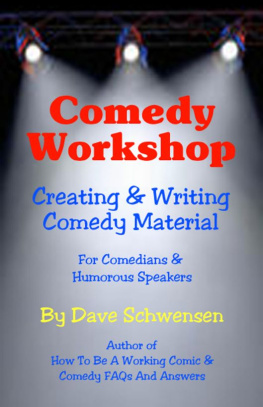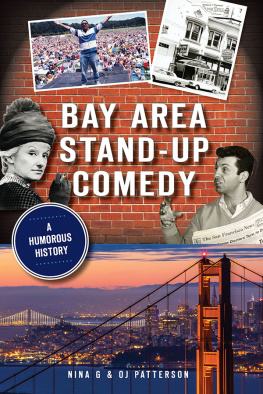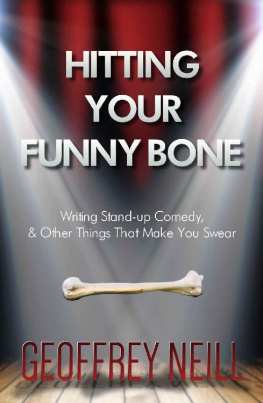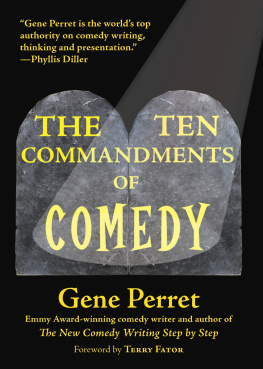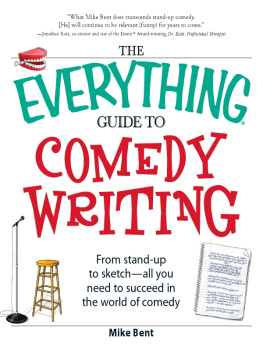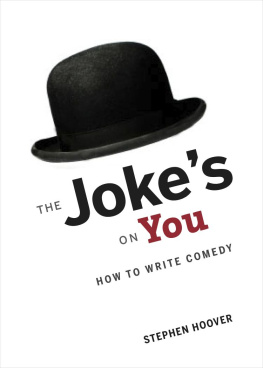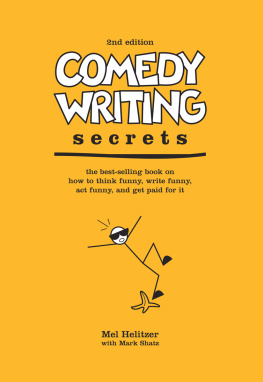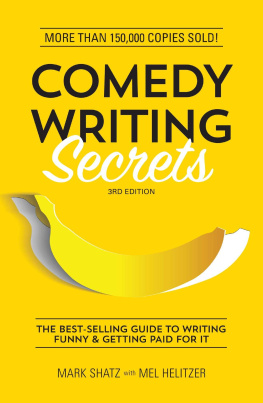COMEDY WORKSHOP
Creating & WritingComedy Material
For Comedians & HumorousSpeakers
Dave Schwensen
North Shore Publishing
Smashwords Edition
Copyright 2013
Contents:
to the Comedy Workshop
1. The and Passion to GetStarted
2. Dont Become a ComedyWriting
To Write ComedyMaterial
4. Get Your Act
5. The Comedy Writing AdviceEver
Too Much Material intoWorkable Material
7. Is Your for Jokes orStories?
8. Using Your License
9. When Offer MaterialShould You Use It?
It Says Clean Fun Is Some Raunchy Ok?
Monologue WritingTechniques
12. Developing for CorporateBookings
13. Turn Writing into GreatPerformances
14. Write for and Not for Reading
the author / Title Page / Copyright
Introduction to the Comedy Workshop
When I started runningcomedy workshops well, to be honest, I didn't know I wasactually starting anything. It just happened.
I was hanging around acomedy club visiting a headliner I had worked with in New York andLos Angeles. A few of the local comics were looking at mewondering, "Who's that guy?" Then the headliner told them I was the talentcoordinator for a television show called A&E's An Evening at the Improv and the Hollywood Improv comedy club. Before that I had beenthe talent booker for The Original Improv in New YorkCity.
Since aspiring comedians would rather becalled working comedians, which would mean performances at The Improv andtelevision appearances, I was suddenly a popular guy. I ended upanswering all kinds of questions about the business and comics Ihad worked with.
It was a fun night and that was it. At leastI thought that was it. The next weekend the same thing happened,only with a different headliner and different aspiringcomedians.
I had been a guest speaker at comedy classesin Los Angeles and New York and knew if the person running itshared experienced tips and practical advice, it could take acouple months off the hard-knocks learning process comedians gothrough to join the professional ranks. So I thought I'd doone.
I rented a comedy club for three Saturdayafternoons and put the word out. The idea was simple. Along withanswering questions about the industry, the comedians would performa short set every week. Then we'd talk about the material anddelivery, and everyone could offer helpful ideas andsuggestions.
That was the original concept. Thesesessions would be business seminars with performance coaching. Itwould also give everyone the opportunity to be part of a writer'sgroup. Not a bad idea.
The goal was to make ita workshop ratherthan a class ,because there would be no teacher . My role would be bestdefined as a coach , while everyone could participate and have a voice in thecreative process. And since a smaller group allows moreopportunities to be involved, it was limited to only ten aspiringcomedians.
I thought it would be a one-time deal.That's it - period. But then a funny thing happened
The workshops havecontinued for almost two decades. Along the way the coach, (that'sme if you're paying attention), has become a published author withtwo previous books about the comedy and entertainmentbusiness; How To Be A Working Comic: AnInsider's Guide To A Career In Comedy and Comedy FAQs And Answers: How TheStand-Up Biz Really Works . Other projectshave included comedy business seminars in cities throughout theU.S., an award-winning newspaper humor column, and designing andinstructing courses for universities on using humor and creativityin business communications and presentation skills.
How time flies when you're laughing
Comedy Workshop: Creating& Writing Comedy Material is based onthe same concept as the workshops: group participation in thecreative process. But as you can tell from the title, it's specificto one element of that process. This is a guidebook to help youdevelop comedy material and sticks to that topic. Future guideswill cover performing and promotion, but let's not get ahead ofourselves. You have to write something first before you can performand promote it.
The format for this book issimple and one I'm comfortable with. Similar to Comedy FAQs And Answers , questionswere sent in by aspiring comedians and humorous speakers through myweekly e-newsletter . The answers comefrom workshop experiences and collaborations that have helpedliterally hundreds of aspiring and working comedians create andwrite comedy material.
But before I stop my long-windedintroduction and get into the heart of the topic, I need to pointout that this book is not only for stand-up comedians. Humorousspeakers have also been important participants in my workshops.There's nothing worse than a boring presentation, and nothingbetter to liven it up than a healthy dose of original humor.
Then again, maybe there is something worse:a too long introduction by a long-winded author. So with thatrealization, I'll stop here and get to the point of this book,which is writing comedy. And whether you're a stand-up comedian orhumorous speaker, I hope you find the following guide to beworthwhile and helpful toward furthering your career. Thanks forreading and as always
Keep Laughing!!
Dave Schwensen
TheComedyBook.com
#1 - The Gift and Passion to Get Started
When you know you have a Gift with words andactions along with Passion, how do you get started?
*
Im glad to see there are two importantwords capitalized in that question:
* Gift
* Passion
We could substitute theword Talent for Gift andIm sure no one would argue about it. Passion is what you need a lot of ifyoure serious about getting into comedy, humorous speaking, or anyother artistic career. These terms are basic requirements forfinding success in this competitive biz.
I'm sure you'll agree that talent is a giftand cant be taught. Either you have it or you dont. But I hopeyou'll also agree that even the slightest spark of talent can benurtured and coached at least to a point where it doesnt have tobe buried inside forever as only a "what if?" personal wish.
To make that a bit clearer,let's say you have a secret desire to paint. The raw talent youpossess might not be enough to land your work in an art museum, butyou'll never know unless you try. Instead of sitting around thehouse dreaming of framed landscapes or portraits, you act on yourdesire and take an art class. With proper instruction you can learn proventechniques, such as mixing colors or using various brushstrokes.
With proper coaching you should beinspired to be creative. Your learned ability to mix colors and useof different brush strokes would be the basic tools that allow youto grow as an artist and express yourself on a canvas.
Along the way, you may discover a passionfor doing this. You didnt know for sure whether or not the resultswould end up in a museum or on your refrigerator. But you tried it,thus avoiding the dreaded "what if?" and now you love doing it. Youhave the passion.
Sometimes talent is buried inside. You mightfeel you have it, but dont really know unless you make an effortto bring it out. And if you feel you have this talent or gift, doyou have the desire, drive and need to pursue it as a career?
Thats where passion comes in. If you trulyenjoy doing something, whether it's comedy or speaking, or sports,music, cooking, collecting stamps, or whatever it might be, you'llfind a way to do it. But if you lack true desire and have no realinterest, then it's a good idea to find something else you'repassionate about and do that instead.
Making a successful career in comedy orspeaking is not for the faint of heart. Talent and passion are apowerful combination, but you also have to be prepared mentally. Inother words, you need to stay focused and develop a thick skin.Success is always the goal, but be prepared to deal with the lowsand rejections while developing your talent along the way.
Next page
